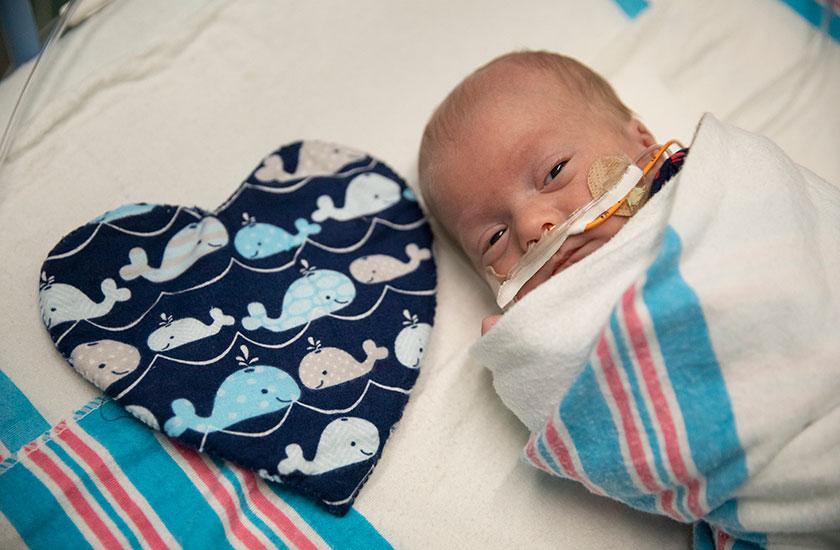Having a newborn in a hospital’s neonatal intensive care unit, or NICU, can be extremely isolating for parents, who often must wait weeks or months to cuddle their baby at home. To ease this separation, nurses in the Rush University College of Nursing and a local quilting club are sewing handmade fabric hearts to help newborns and their parents bond by sharing their scents.
Sense of smell develops early
“The sense of smell is one of the earliest senses to develop,” says Christie Lawrence, DNP, RNC-NIC, APN/CNS, clinical nurse specialist and assistant professor in the Department of Women, Children and Family Nursing. “Fetuses can actually recognize their mothers’ amniotic fluid while still in the womb.” Amniotic fluid, which babies swallow and breathe during their time in utero, contains the smells of food the mother eats as well as of the mom herself.
Because of this fact, in late 2017 Lawrence and Terry Gallagher, DNP, APRN, FNP-BC, CNL, assistant professor, discussed the benefits of using “smell cloths” in the NICU.
“After birth, the sense of smell continues to develop, and it is one of the senses that helps the infant recognize the mother,” says Lawrence. “So having the mom’s familiar scent can really help ease an infant’s stress and discomfort.”
For new parents, being able to smell their baby also brings a sense of calm. Lawrence says parents can feel overwhelmed and disconnected when they see their infants in incubators in a NICU, but familiar scents can help families forge a closer connection.
Threading together a community
To create the 8-inch cloth hearts, the nurses joined forces with a quilting club of residents from Oakley Square Apartments, a mixed-income residential complex on Chicago’s West Side. Most of the residents receive care at the Sue Gin Health Center at Oakley Square, an on-site primary care clinic founded in 2015 by the College of Nursing’s Office of Faculty Practice. Each year the clinic provides primary care and education to approximately 500 Medicaid or uninsured patients of all ages.
“Our goal is to provide high-quality care in a nurse-managed clinic to people who previously did not have access to primary care,” says Gallagher, who is also a nurse practitioner at the clinic.
The clinic provides much more than care — it’s also a direct link to active community residents like Janeen Allen, a member of the Oakley Square quilting club. Allen and her fellow quilters have been sewing the NICU fabric hearts since December 2017.
Each year, the level III NICU — which has the capacity to take care of infants who are critically ill — admits 800 babies born prematurely, who often spend weeks or months in the unit getting stronger before they can go home.
The College of Nursing is committed to continue funding for the program annually and plans to purchase enough materials to produce as many as 1,600 hearts per year.
“Sewing the hearts gives us an opportunity to give back,” Allen says. “It’s fun to know that with the little hearts we’re making right now, somebody may have them forever.”
Hearts and scents travel from parents to baby and back
When families in the NICU receive cloth hearts, parents pin them inside their clothes. When the parents return to the NICU, the hearts are unpinned and placed inside the incubator so the baby can be comforted by their scent.
The process also works in reverse. After the hearts are in the incubator for a while, the cloth picks up the baby’s scent. Once returned to the parents, the baby’s scent comforts the parents. After laundering, the process can be repeated.
Though Allen prefers to sew hearts by hand, other quilters use the sewing machine provided by Rush two years ago. The machine was a thank you gift to the quilters for their help with another project: making blankets for young mothers at the Simpson Academy for Young Women, a school for pregnant women and young mothers on Chicago’s West Side.
Lawrence says the project is an example of the family centered care and cross-generational community outreach that the College of Nursing faculty tries to foster. Their goal: to help people support each other.
Training nurses while providing service to the community
The Sue Gin Health Center at Oakley Square, named for the late CEO of a retail- and airline-catering company and longtime Rush Board of Trustees member, is one of more than 20 partnerships formed by the College of Nursing’s Office of Faculty Practice to give nurses educational and outreach opportunities around Chicago.
“Our mission is to provide training sites for nurses and nurse practitioners, but also for the faculty to serve the community,” Gallagher says. “Our programming is based on what the residents tell us they need and want.”
Gallagher says the partnership with the residents at Oakley Square demonstrates Rush’s respect for its community, as well as the community’s respect for the quality of care provided by nurses at the on-site clinic.
“We work here, we live here, and we want to be a community partner,” Gallagher says. “This creates a thriving, healthy and happy community.”
“Sometimes the programming is a way to get people together,” she says. “It’s a way to assign hope.”

